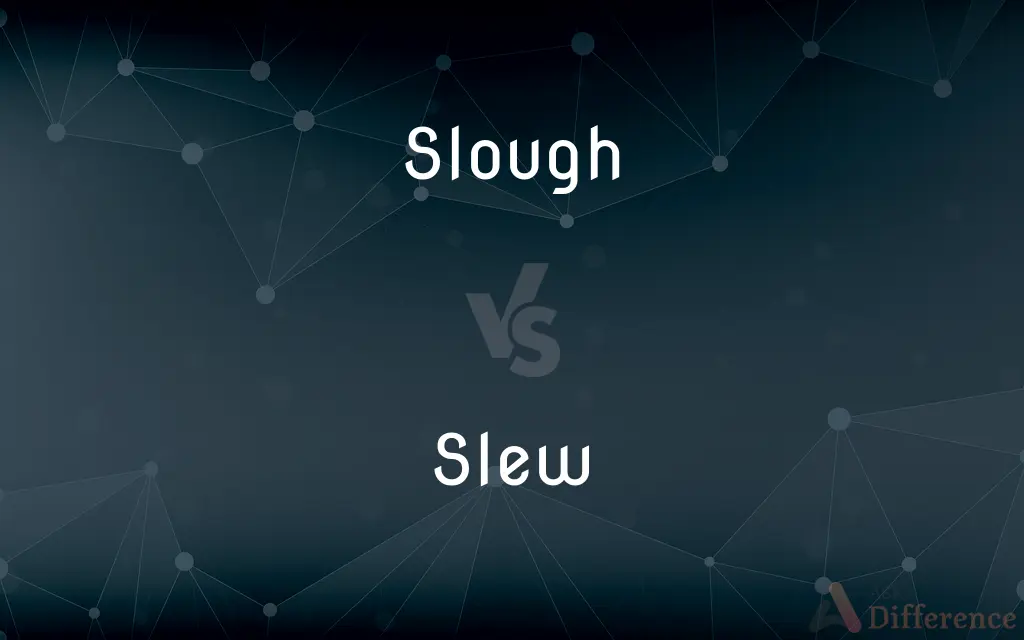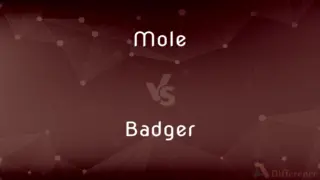Slough vs. Slew — What's the Difference?
By Tayyaba Rehman — Updated on December 29, 2023
"Slough" refers to a swamp or a situation characterized by lack of progress, while "slew" is a past tense of "slay" or can mean a large number or quantity.

Difference Between Slough and Slew
Table of Contents
ADVERTISEMENT
Key Differences
Slough often describes a natural wetland area, typically a swamp or marsh. Slew, in its verb form, is the past tense of slay, meaning to kill, and as a noun, it denotes a large number or quantity.
A slough can be a physical location, often wet and muddy. A slew can either refer to the action of having killed in the past or to an abundance of something.
Metaphorically, slough can describe a state of moral degradation or a situation where progress is difficult. Slew, as a noun, is used to describe a large amount, often in an informal context.
Slough in environmental terms refers to a specific type of wetland ecosystem. Slew does not pertain to the environment but rather to quantity or an action in the past.
Slough can be pronounced as slou (rhymes with cow) or sloo (rhymes with true), depending on its usage. Slew is pronounced as sloo and is clear in its context as either a past action or a descriptor of quantity.
ADVERTISEMENT
Comparison Chart
Definition
A swamp or wetland; a state of stagnation
Past tense of "slay"; a large number or quantity
Part of Speech
Noun
Verb (past tense) or Noun
Usage in Sentence
Describes a location or situation
Describes an action or quantity
Context
Environmental, metaphorical
Action-oriented, quantitative
Pronunciation
"Slou" or "sloo"
"Sloo"
Compare with Definitions
Slough
A swamp or wetland.
Birds were nesting in the slough.
Slew
Past tense of slay, meaning to have killed.
The knight slew the dragon.
Slough
A condition of being bogged down or stuck.
The project was in a slough due to funding issues.
Slew
A large number or quantity of something.
She had a slew of questions after the presentation.
Slough
A state of moral degradation.
The novel describes the protagonist's slough of despair.
Slew
To have caused the downfall of someone or something.
The hero slew the villain in the final battle.
Slough
A situation characterized by lack of progress or stagnation.
He found himself in a slough of despond.
Slew
Turn or slide violently or uncontrollably
He slewed the aircraft round before it settled on the runway
The Renault slewed from side to side in the snow
Slough
A mire or a boggy area.
They had to navigate through the slough carefully.
Slew
(of an electronic device) undergo slewing.
Slough
Slough () is a large town in Berkshire, England (within the historic county of Buckinghamshire), 20 miles (32 km) west of central London (Charing Cross) and 19 miles (31 km) north-east of Reading. It is in the Thames Valley and within the London metropolitan area at the intersection of the M4, M40 and M25 motorways.
Slew
A violent or uncontrollable sliding movement
I was assaulted by the thump and slew of the van
Slough
A town in south-eastern England to the west of London; population 119,400 (est. 2009).
Slew
A large number or quantity of something
He asked me a slew of questions
Slough
Shed or remove (a layer of dead skin)
A snake sloughs off its old skin
Exfoliate once a week to slough off any dry skin
Slew
A large amount or number; a lot
A slew of unpaid bills.
Slough
(of soil or rock) collapse or slide into a hole or depression
An eternal rain of silt sloughs down from the edges of the continents
Slew
Variant of slough1.
Slough
A depression or hollow, usually filled with deep mud or mire.
Slew
The act of slewing.
Slough
Also slue A swamp, marsh, bog, or pond, especially as part of a bayou, inlet, or backwater.
Slew
A past tense of slay.
Slough
A state of deep despair or moral degradation.
Slew
To turn (something) on an axis; rotate
Slewed the swivel chair around.
Slewing the boom of a crane.
Slough
The dead outer skin shed by a reptile or amphibian.
Slew
To turn sharply; veer
Braked and slewed the car around.
Slough
(Medicine)A layer or mass of dead tissue separated from surrounding living tissue, as in a wound, sore, or inflammation.
Slew
To turn about an axis
"The violet eyes slewed from door to window as if desperate for escape" (P.D. James).
Slough
An outer layer or covering that is shed or removed.
Slew
To turn or slide sideways or off course; skid.
Slough
To be cast off or shed; come off
"smooth fallen branches from which all bark has sloughed" (David M. Carroll).
Slew
The act, or process of slewing.
Slough
To shed a slough
Every time that a snake sloughs.
Slew
A device used for slewing.
Slough
(Medicine)To separate from surrounding living tissue. Used of dead tissue.
Slew
A change of position.
Slough
To cast off or shed (skin or a covering)
Came inside and sloughed off his coat.
Slew
A wet place; a river inlet.
Slough
To discard or disregard as undesirable or unfavorable
Sloughed off her misgivings.
Slew
(US) A large amount.
She has a slew of papers and notebooks strewn all over her desk.
Slough
The skin shed by a snake or other reptile.
That is the slough of a rattler; we must be careful.
Slew
To rotate or turn something about its axis.
Slough
Dead skin on a sore or ulcer.
This is the slough that came off of his skin after the burn.
Slew
(transitive) To veer a vehicle.
Slough
(British) A muddy or marshy area.
Slew
(transitive) To insert extra ticks or skip some ticks of a clock to slowly correct its time.
Slough
(Eastern United States) A type of swamp or shallow lake system, typically formed as or by the backwater of a larger waterway, similar to a bayou with trees.
We paddled under a canopy of trees through the slough.
Slew
(intransitive) To pivot.
Slough
(Western United States) A secondary channel of a river delta, usually flushed by the tide.
The Sacramento River Delta contains dozens of sloughs that are often used for water-skiing and fishing.
Slew
(intransitive) To skid.
Slough
A state of depression.
John is in a slough.
Slew
To move something (usually a railway line) sideways.
The single line was slewed onto the disused up formation to make way for the future redoubling.
Slough
(Canadian Prairies) A small pond, often alkaline, many but not all formed by glacial potholes.
Potholes or sloughs formed by a glacier’s retreat from the central plains of North America, are now known to be some of the world’s most productive ecosystems.
Slew
To make a public mockery of someone through insult or wit.
Slough
(transitive) To shed (skin).
This skin is being sloughed.
Snakes slough their skin periodically.
Slew
See Slue.
Slough
(intransitive) To slide off (like a layer of skin).
A week after he was burned, a layer of skin on his arm sloughed off.
Slew
A wet place; a river inlet.
The praire round about is wet, at times almost marshy, especially at the borders of the great reedy slews.
Slough
To discard.
East sloughed a heart.
Slew
(often followed by `of') a large number or amount or extent;
A batch of letters
A deal of trouble
A lot of money
He made a mint on the stock market
It must have cost plenty
Slough
To commit truancy, be absent from school without permission.
Slew
Turn sharply; change direction abruptly;
The car cut to the left at the intersection
The motorbike veered to the right
Slough
Slow.
Slew
Move obliquely or sideways, usually in an uncontrolled manner;
The wheels skidded against the sidewalk
Slough
A place of deep mud or mire; a hole full of mire.
He's here stuck in a slough.
Slew
To have defeated or overcome.
He slew his fears and succeeded.
Slough
A wet place; a swale; a side channel or inlet from a river.
Slew
An abundance or a great amount.
There was a slew of evidence against the accused.
Slough
The skin, commonly the cast-off skin, of a serpent or of some similar animal.
Slough
The dead mass separating from a foul sore; the dead part which separates from the living tissue in mortification.
Slough
To form a slough; to separate in the form of dead matter from the living tissues; - often used with off, or away; as, a sloughing ulcer; the dead tissues slough off slowly.
Slough
To cast off; to discard as refuse.
New tint the plumage of the birds,And slough decay from grazing herds.
Slough
Necrotic tissue; a mortified or gangrenous part or mass
Slough
A hollow filled with mud
Slough
A stagnant swamp (especially as part of a bayou)
Slough
Any outer covering that can be shed or cast off (such as the cast-off skin of a snake)
Slough
Cast off hair, skin, horn, or feathers;
Out dog sheds every Spring
Common Curiosities
Can "slew" be used in formal writing?
As a noun, it's more informal; as a past tense verb, it's standard.
Can "slough" refer to shedding skin?
Yes, in biology, "sloughing" refers to shedding or casting off, particularly skin.
Is "slew" commonly used today?
It's less common in modern English but still recognized and used.
Is a slough always a negative term?
In environmental terms, no; in metaphorical usage, it often has negative connotations.
Can "slew" be used metaphorically?
Yes, it can be used metaphorically, especially in the sense of overcoming challenges.
Does "slew" have synonyms?
Yes, for the noun form, synonyms include multitude, abundance; for the verb, killed or defeated.
Is the preservation of sloughs important?
Yes, as they play crucial roles in biodiversity and water filtration.
Can "slew" refer to a large group of people?
Yes, it can refer to a large group or amount of almost anything.
Are sloughs navigable by boat?
Some sloughs can be, depending on their size and depth.
Are sloughs important ecosystems?
Yes, they provide important habitats for many species.
Are all sloughs freshwater?
No, some sloughs can be brackish or have varying salinity levels.
Is "slew" a formal term for killing?
It's standard but has an old-fashioned or literary tone.
Do sloughs support fish populations?
Yes, many sloughs provide habitat for various fish species.
Can sloughs be found in urban areas?
Yes, sloughs can exist in both rural and urban settings.
Can "slew" mean a quick movement?
No, that's a different word, "slue," which means to turn sharply.
Share Your Discovery

Previous Comparison
Mole vs. Badger
Next Comparison
Amend vs. EmendAuthor Spotlight
Written by
Tayyaba RehmanTayyaba Rehman is a distinguished writer, currently serving as a primary contributor to askdifference.com. As a researcher in semantics and etymology, Tayyaba's passion for the complexity of languages and their distinctions has found a perfect home on the platform. Tayyaba delves into the intricacies of language, distinguishing between commonly confused words and phrases, thereby providing clarity for readers worldwide.














































